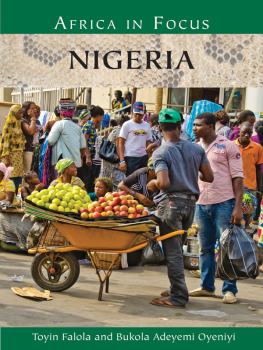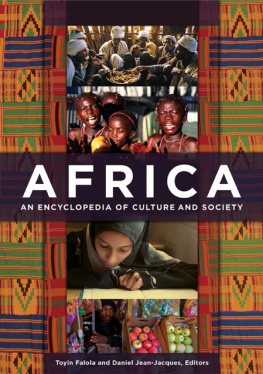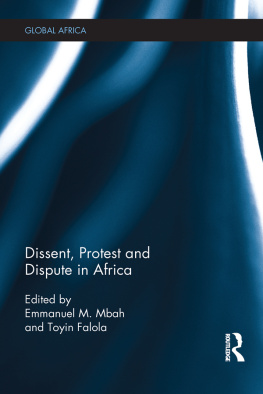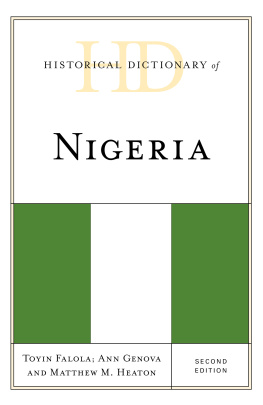Falola Toyin - Nigeria
Here you can read online Falola Toyin - Nigeria full text of the book (entire story) in english for free. Download pdf and epub, get meaning, cover and reviews about this ebook. City: Nigeria, year: 2015, publisher: ABC-CLIO, LLC, genre: Politics. Description of the work, (preface) as well as reviews are available. Best literature library LitArk.com created for fans of good reading and offers a wide selection of genres:
Romance novel
Science fiction
Adventure
Detective
Science
History
Home and family
Prose
Art
Politics
Computer
Non-fiction
Religion
Business
Children
Humor
Choose a favorite category and find really read worthwhile books. Enjoy immersion in the world of imagination, feel the emotions of the characters or learn something new for yourself, make an fascinating discovery.
- Book:Nigeria
- Author:
- Publisher:ABC-CLIO, LLC
- Genre:
- Year:2015
- City:Nigeria
- Rating:4 / 5
- Favourites:Add to favourites
- Your mark:
- 80
- 1
- 2
- 3
- 4
- 5
Nigeria: summary, description and annotation
We offer to read an annotation, description, summary or preface (depends on what the author of the book "Nigeria" wrote himself). If you haven't found the necessary information about the book — write in the comments, we will try to find it.
Nigeria — read online for free the complete book (whole text) full work
Below is the text of the book, divided by pages. System saving the place of the last page read, allows you to conveniently read the book "Nigeria" online for free, without having to search again every time where you left off. Put a bookmark, and you can go to the page where you finished reading at any time.
Font size:
Interval:
Bookmark:

NIGERIA
Titles in ABC-CLIOs Latin America in Focus Series
Venezuela Elizabeth Gackstetter Nichols and Kimberly J. Morse
Titles in ABC-CLIOs Africa in Focus Series
Eritrea Mussie Tesfagiorgis G.
Ethiopia Paulos Milkias
Titles in ABC-CLIOs Asia in Focus Series
China Robert Andr LaFleur, Editor
Japan Lucien Ellington, Editor
The Koreas Mary E. Connor, Editor

Copyright 2015 by ABC-CLIO, LLC
All rights reserved. No part of this publication may be reproduced, stored in a retrieval system, or transmitted, in any form or by any means, electronic, mechanical, photocopying, recording, or otherwise, except for the inclusion of brief quotations in a review, without prior permission in writing from the publisher.
Library of Congress Cataloging-in-Publication Data
Falola, Toyin.
Nigeria / Toyin Falola and Bukola Adeyemi Oyeniyi.
pages cm. (Africa in focus)
Includes bibliographical references and index.
ISBN 978-1-59884-968-4 (hardback) ISBN 978-1-59884-969-1 (e-book)
1.NigeriaHistory.2. NigeriaCivilization.I.Oyeniyi, Bukola Adeyemi.II.Title.
DT515.57.F355 2015
966.9dc232014034549
ISBN: 978-1-59884-968-4
EISBN: 978-1-59884-969-1
191817161512345
This book is also available on the World Wide Web as an eBook.
Visit www.abc-clio.com for details.
ABC-CLIO, LLC
130 Cremona Drive, P.O. Box 1911
Santa Barbara, California 93116-1911
This book is printed on acid-free paper 
Manufactured in the United States of America
For Professor Ayo Olukotun,
an outstanding scholar, a veteran journalist, an administrator, and a committed social critic. May the future of his country be better than its past.
Toyin Falola, PhD, is the Jacob and Frances Sanger Mossiker Chair in the Humanities and University Distinguished Teaching Professor at the University of Texas at Austin. He is the author of numerous books, including Key Events in African History: A Reference Guide; Culture and Customs of Nigeria; and The History of Nigeria. His memoir, A Mouth Sweeter Than Salt, captures his childhood years, while a forthcoming one, Counting the Tigers Teeth, is about his years as a teenager. He has received honorary doctorates from Monmouth University and City University of New York, Staten Island, in the United States, and Lead City University and Adekunle Ajasin University, both in Nigeria. He currently serves as the president of the African Studies Association.
Bukola Adeyemi Oyeniyi, PhD, a researcher in African social and cultural history, was born in Nigeria, where he completed his undergraduate and graduate studies. He studied classics and later history at the University of Ibadan. He then obtained his doctorate degree from the Institute for History, Leiden University, the Netherlands. His research interests cover the wider spectrum of African social and cultural history. He has published on dress and identity, culture and identity, conflict and terrorism, migration and development, among other issues. His most recent works include Internal Migration in Nigeria: A Positive Contribution to Human Development; One Voice, Multiple Tongues: Dialoguing with Boko Haram in the journal Democracy and Security; and Dress in Nigerias Nationalist Discourse in the journal Identity, Culture and Politics. Oyeniyi is currently an assistant professor of African history at Missouri State University, Springfield, United States. He is a Fellow of the Institute for Advanced Studies, New Europe College, Bucharest, Romania.
This book is about the Federal Republic of Nigeria, a country of great importance located in West Africa. In addition to its abundant mineral wealth, the nations population of over 170 million people makes it the most populated black nation in the world. Nigerias greatness does not lie solely in its mineral wealth and huge population but also in the diversity of its land, peoples, and culture.
Bordering the Gulf of Guinea on the Atlantic Ocean in the south, Niger Republic in the north, Republic of Benin in the west, and Cameroon and Chad to the east, Nigeria is a federal constitutional republic. It comprises 36 states, and its capital, the Federal Capital Territory (FCT), is located at Abuja.
Sitting on a landmass of about 923,768 sq. km (356,667 sq. miles), Nigeria, officially the Federal Republic of Nigeria, was, for almost a century, under British Imperial rule. However, it gained its independence on October 1, 1960. The nation is, therefore, a young one. Nigeria is not only the most populous country in Africa, but also the seventh most populous country in the world. It is a home to over 500 ethno-linguistic groups; the Hausa, Igbo, and Yoruba ethno-linguistic groups comprise the three largest. The countrys inhabitants are roughly evenly divided between Christians, who live predominantly in the south and central parts, and Muslims, a great majority of whom live in the north and the southwest. About 10 percent of the population, especially among Igbo and Yoruba people, practices traditional and indigenous religions.
Nigeria is a federal constitutional republic comprising 36 states, 774 local government councils, and an FCT. The FCT is located in central Nigeria in Abuja, and it is the seat of the federal government and the nations capital. Prior to 1991, when Abuja became the nations capital, Nigerias national capital was Lagos, a Yoruba city, located on the southwestern coast.
Although located within a single time zone, Nigerias geographic features exhibit regional differences. The south is cooler and comprises rivers and creeks, undulating landscapes, dense forests, and other features that facilitate a unique ecosystem. In the north, the temperature is hot, and a sizeable part of the land is dry. Mountains mark the northeastern part of the country. Along the Borno corridor, occasional big rivers and abundant dense forests near the central region are interspersed among dry, patched land. These widely differentiated landscapes inform the variety of agricultural products, diverse histories, and unique socioeconomic and cultural makeup of the country as a whole.
Prior to 1914 when, under British Imperial rule, the different peoples who make up present-day Nigeria were amalgamated, the different ethno-linguistic groups lived independently of one another. Intergroup relations were sometimes premised on trade and commerce, sociocultural and political exchanges, and the like, and these different ethno-linguistic groups existed as equals. The histories of these different groups reveal relationships that had been in existence over generations. Excavated artwork provides a testament to the antiquity of intergroup relationships, borrowing, and exchanges. The oral traditions and histories among the different groups also confirm that the independent groups were also interrelated through kinship. In most places, social charters existed that helped the different groups foster peaceful relations, even between bigger groups and relatively smaller ones.
The advent of colonialism and its divisive rule and administrative style unwound the complex tapestry of relationship that the different ethno-linguistic groups weaved before colonial rule. Modern Nigerian people now regard the 1914 amalgamation as a mistake. British colonial officials were either ignorant of earlier histories of relationships between native people or deliberately distorted reality by asserting that Nigeria is not a nation per se, but a mere geographical expression. The nation is bedeviled by the problem of political leadership, a problem that masquerades as ethnic, religious, economic, and sociocultural differences in todays world.
Font size:
Interval:
Bookmark:
Similar books «Nigeria»
Look at similar books to Nigeria. We have selected literature similar in name and meaning in the hope of providing readers with more options to find new, interesting, not yet read works.
Discussion, reviews of the book Nigeria and just readers' own opinions. Leave your comments, write what you think about the work, its meaning or the main characters. Specify what exactly you liked and what you didn't like, and why you think so.







